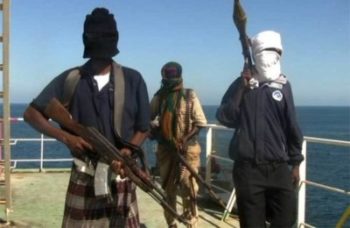
The time has perhaps come when Nigeria should begin to take more drastic measures to stem the tide of sea piracy, which has assumed an alarming dimension in recent times, in its waterways. More than ever before, sea piracy has taken the turn for the worse in Nigeria.
In recent years, thousands of seafarers have been killed, injured, assaulted, taken hostage or threatened as piracy and armed robbery have increased dramatically.
The incidence of sea piracy in the country is actually not a new phenomenon but has now become one of the major debilitating factors against the development of the country’s maritime industry. The international dimension of the impact of piracy on the maritime industry worldwide has necessitated concerted global efforts at curbing the dangerous menace.
Worldwide, in the first three months of 2018, 100 crew were taken hostage and 14 kidnapped from their vessels. A total of 39 vessels were boarded, 11 fired upon and four vessels hijacked. This has been a reoccurring challenge for many years.
A report by the United States Department of State’s Bureau of Economic and Business Affairs revealed that maritime criminality in the Nigerian waters, including piracy and crew kidnap for ransom has been on the increase in recent years to the point that law enforcement efforts have been limited or ineffectual.
Last year, September 22, and coming closer home, a gang of pirates took hostage 12 crew members of a Swiss cargo ship in Nigerian waters. The vessel operator, Massoel Shipping, reported that its bulk carrier, MV Glarus, with19 crew members came under attack as it transported bulk wheat from Nigeria’s commercial capital, Lagos to the southern oil hub of Port Harcourt.
During the attack, which occurred around 45 nautical miles Southwest of Bonny Island, the criminals reportedly destroyed much of the vessel’s communication equipment and took 12 of the 19 crew members hostage.
In its first quarter 2018 report, the International Chamber of Commerce’s International Maritime Bureau (IMB) reported that its piracy reporting center recorded 66 incidents in the first quarter of 2018, up from the 43 recorded in the corresponding period in 2017, and 37 incidents in the first quarter of 2016. The report stated that Nigeria alone recorded 22 incidents between January and March 2018. And of the 11 vessels fired upon worldwide, eight were off Nigeria’s coast.
In the International Maritime Organization (IMO) report for the first and second quarters of 2018, Nigeria ranked top in countries with the highest number of recorded attacks against vessels. Nigeria alone accounted for a total of 22 of the 45 attacks in the first three months of 2018.
What baffles many is that these attacks, which were usually rampant along the coasts of war torn countries such as Somalia, Ethiopia and Libya have shifted from these climes and have disgracefully found comfortable routes into Nigeria. Lamentably and regrettably, Nigeria has displaced war-torn Somalia, which was notorious for sea piracy in the past, in the shameful category of countries with unsafe waterways. Surprisingly and happily, the notorious Somalia waters did not record any incident in the second quarter of 2018.
The statistics contained in these are frightening and registers an indication that Nigeria has taken over from Somalia as the home of sea piracy. Six years ago, Somalia was a hotbed of piracy, and hundreds of attacks cost the shipping industry billions of dollars. But a combination of maritime patrols, stronger Somali security forces and better security protocols by mariners mean attacks are now rare in Somalia.
Commendably, the government in Somalia has taken a hardline posture against the Islamist militant group, Al-Shabaab and a rival splinter faction that has pledged allegiance to Islamic State. This posture has greatly contributed to the reduction of criminalities off the Horn of Africa.
The economic cost of sea piracy reaches far beyond Nigeria’s shores and deep into other West African countries. The impact of sea piracy has been felt both far away and closer to home as two recent studies have shown.
For instance, the Colorado-based research and advocacy group, One Earth Future Foundation, estimated that the total cost of piracy in 2011 was as high as $6.9 billion. Ransom payments are the most obvious cost created by piracy. The magnitude of these reportedly reached a new record in April 2011 when Greek owners paid $13.5 million for the release of their oil tanker taken hostage along the Nigerian ocean.
It is, therefore, against these backdrops that the Nigerian government must take drastic steps to address the menace of sea piracy to save the country from its asphyxiating economic and sociopolitical consequences. The truth is that Nigeria may incur the wrath of the rest of the international community if sea piracy persists in increasing proportions in its waters.